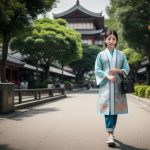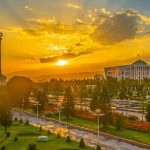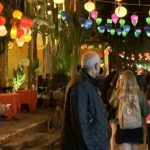Adapting to the Warm Embrace of the Philippines: A Cultural Immersion for British Retirees
The archipelago of the Philippines, with its year-round tropical climate, bustling cities, and tranquil islands, has been charming British retirees for decades. Known for its vibrant culture, the country offers a delightful blend of modernity and tradition, making it an ideal choice for those seeking a serene yet engaging retirement life. However, as with any foreign land, assimilating into the local culture can be a fascinating yet challenging endeavor. This article serves as an extended guide for those looking to navigate the nuances of the Philippines with ease and respect.
The Cultural Tapestry of the Philippines
The Philippines is a melting pot of Asian, Spanish, and American influences, which has shaped its unique culture. As a British retiree, understanding the core values and norms of this Southeast Asian gem will significantly enhance your integration into the local community.
The Heart of Hospitality
One of the most striking features of the Philippines is the unparalleled hospitality of its people. The term “Mabuhay” is not just a greeting; it encapsulates the essence of the welcoming spirit that pulses through the veins of every Filipino. They are eager to assist and embrace foreigners with open arms, ensuring that you feel at home from the moment you arrive. This warmth is reflected in every aspect of daily life, from the welcoming smiles on the street to the willingness to go the extra mile to ensure your comfort.
The Stronghold of Family Ties
Family is the cornerstone of the Filipino way of life. The concept of “extended family” is deeply rooted here, with relatives playing an active role in each other’s lives. The respect for elders, known as “po” and “mamang,” is a cultural hallmark. It is not uncommon to see multiple generations living under one roof, and grandparents are often revered as the head of the family. This strong sense of familial bond is reflected in the way they interact with each other and in the importance they place on family gatherings and celebrations.
The Dance of Patience and Optimism
The national psyche of the Philippines is one of patience and resilience. The “bahala na” attitude is a testament to their ability to remain hopeful and unflappable in the face of adversity. This laid-back approach to life can be a breath of fresh air for the typically fast-paced British lifestyle. Learning to appreciate and adapt to the local tempo will not only make your interactions smoother but also allow you to absorb the contagious positive vibe that resonates throughout the country.
The Language of the Land
While the Philippines is one of the few Asian countries where English is widely spoken, making the initial transition less daunting, learning the local language, Tagalog, is a gesture of respect and a gateway to deeper connections with the locals. The effort to converse in their mother tongue, even in simple ways, can bridge cultural gaps and foster friendships. Start with basic phrases such as “kumusta po kayo?” (how are you?) and “salamat po” (thank you) to express your gratitude and willingness to engage with the community.
Diving into the Depths of Customs and Etiquette
To truly embrace the culture, one must become adept at the subtleties of Filipino customs and etiquette. The “mano po,” a respectful gesture where you take the hand of an elder and touch it to your forehead, is a symbol of esteem and respect. When it comes to dining, be prepared to use your hands and share your food; it is customary and signifies communal bonding.
The Social Choreography
Filipinos are generally more formal and reserved than their Western counterparts. In social settings, it is advisable to adopt a more conservative approach, refraining from public displays of affection and avoiding controversial topics like politics or religion. Engaging in small talk and asking about family is a safe and respectful way to build relationships.
The Rhythm of Festivals
Immersing yourself in the rich tapestry of Filipino festivals is a must-do for any expat. The Sinulog Festival in Cebu City, a dazzling display of color and faith, celebrates the country’s Christian heritage. Meanwhile, the Ati-Atihan Festival in Kalibo, Aklan, is an exuberant street festival characterized by its indigenous costumes and vibrant dancing. In Baguio City, the Panagbenga Festival, also known as the Flower Festival, showcases the region’s natural beauty with floral floats and street parades. These events are not only a feast for the eyes but also a profound insight into the heart and soul of the Philippines.
Building Bridges Through Community Engagement
To truly become a part of the fabric of the society, it is essential to engage with locals and participate in community activities. Joining expat groups is a great way to find like-minded individuals who can share their experiences and provide a support network. Additionally, volunteer work is widely appreciated and offers an excellent opportunity to contribute positively to your new home while simultaneously learning about the local culture. Language exchange programs are another fantastic avenue for cultural exchange and personal growth.
The Rewards of Cultural Immersion
By embracing the customs and values of the Philippines, British retirees can expect a fulfilling retirement. The rich tapestry of experiences and the bonds formed with locals will undoubtedly enrich your time in this tropical paradise. With a little patience, respect, and an open heart, you can weave your story into the vibrant cultural narrative of the country.
Conclusion
The Philippines is a land of smiles and sunshine, with a culture that is as warm as its climate. By understanding and respecting the local customs and participating in the community, British retirees can create a harmonious and enriching retirement experience. The journey of adapting to this vibrant nation is one filled with joy, learning, and growth. So, pack your bags, don your smile, and get ready to be embraced by the warmth of the Filipino culture.
Related posts:

Ray Brocklesby, the site owner, is a Brit who now lives in the Philippines. He is retired and lives with his wife Weng, Daughter Kristelle, nephews, Harvey and Boknoy, and mother-in-law. Ray also has a son and daughter living in the UK, and a son in New Zealand.













